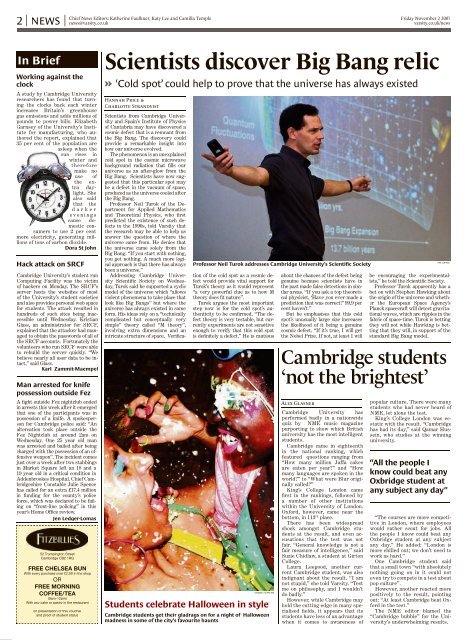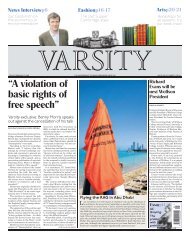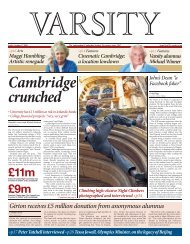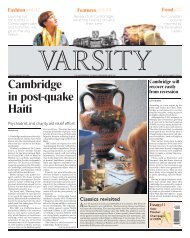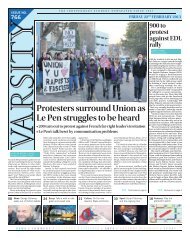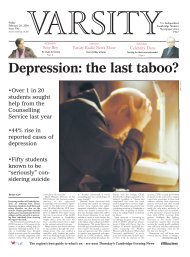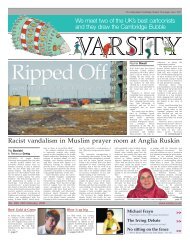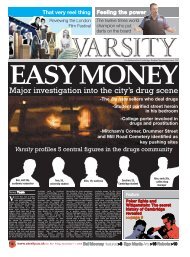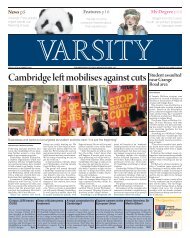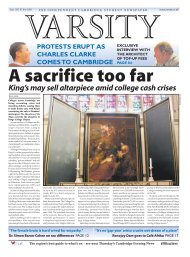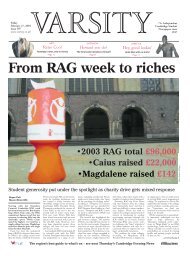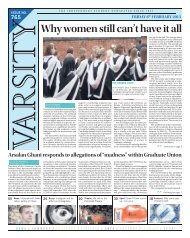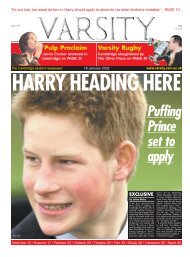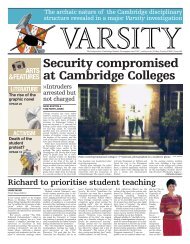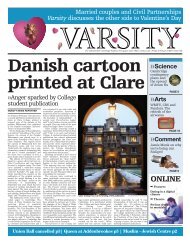2 NEWSChief News Editors: Katherine Faulkner, Katy Lee and Camilla Templenews@varsity.co.ukFriday November 2 2007varsity.co.uk/newsIn BriefWorking against theclockA study by Cambridge Universityresearchers has found that turningthe clocks back each winterincreases Britain’s greenhousegas emissions and adds millions ofpounds to power bills. ElizabethGarnsey of the University’s Institutefor manufacturing, who authoredthe report, explained that35 per cent of the population areasleep when thesun rises inwinter andthereforemake nouse ofthe extradaylight.Shealso saidthat thed a r k e re v e n i n g scause domesticconsumersto use 2 per centmore electricity, generating millionsof tons of carbon dioxide.Dora St JohnHack attack on SRCFCambridge University’s student runComputing Facility was the victimof hackers on Monday. The SRCF’sserver hosts the websites of mostof the University’s student societiesand also provides personal web spacefor students. The attack resulted inhundreds of such sites being inaccessibleuntil Wednesday. KristianGlass, an administrator for SRCF,explained that the attacker had managedto obtain the passwords of all ofthe SRCF accounts. Fortunately thevolunteers who run SRCF were ableto rebuild the server quickly. “Webelieve nearly all user data to be intact,”said Glass.Karl Zammit-MaempelMan arrested for knifepossession outside FezA fight outside Fez nightclub endedin arrests this week after it emergedthat one of the participants was inpossession of a knife. A spokespersonfor Cambridge police said: “Analtercation took place outside theFez Nightclub at around 2am onWednesday. One 25 year old manwas arrested and bailed after beingcharged with the possession of an offensiveweapon”. The incident comesjust over a week after two stabbingsin Market Square left an 18 and a19 year old in a critical condition inAddenbrookes Hospital. Chief CambridgeshireConstable Julie Spencehas called for an extra £17.4 millionin funding for the county’s policeforce, which was declared to be failingon “front-line policing” in thisyear’s Home Office review.Jen Ledger-Lomas52 Trumpington StreetCambridge CB2 1RGFREE CHELSEA BUNWith every purchase over £2.00 in the shopORFREE MORNINGCOFFEE/TEA(9am-12pm)With any cake or pastry in the restauranton presentation of this voucherand proof of student statusScientists discover Big Bang relic» ‘Cold spot’ could help to prove that the universe has always existedHannah Price &Charlotte StrandvistProfessor Neil Turok addresses Cambridge University’s Scientific SocietyScientists from Cambridge Universityand Spain’s Institute of Physicsof Cantabria may have discovered acosmic defect that is a remnant fromthe Big Bang. The discovery couldprovide a remarkable insight intohow our universe evolved.The phenomenon is an unexplainedcold spot in the cosmic microwavebackground radiation that fills ouruniverse as an after-glow from theBig Bang. Scientists have now suggestedthat this particular spot maybe a defect in the vacuum of space,produced as the universe cooled afterthe Big Bang.Professor Neil Turok of the Departmentfor Applied Mathematicsand Theoretical Physics, who firstpredicted the existence of such defectsin the 1990s, told <strong>Varsity</strong> thatthe research may be able to help usanswer the question of where theuniverse came from. He denies thatthe universe came solely from theBig Bang. “If you start with nothing,you get nothing. A much more logicalapproach is that there has alwaysbeen a universe.”Addressing Cambridge UniversityScientific Society on Wednesday,Turok said he supported a cyclicmodel of the universe which “allowsviolent phenomena to take place thatlook like Big Bangs” but where theuniverse has always existed in someform. His ideas rely on a “technicallycomplicated but conceptually verysimple” theory called “M theory”,involving extra dimensions and anintricate structure of space. Verificationof the cold spot as a cosmic defectwould provide vital support forTurok’s theory as it would represent“a very powerful clue as to how Mtheory does fit nature”.Turok argues the most importantstep now is for the cold spot’s authenticityto be confirmed. “The defecttheory is very testable, but currentlyexperiments are not sensitiveenough to verify that this cold spotis definitely a defect.” He is cautiousDEBBIE SCANLANStudents celebrate Halloween in styleCambridge students get their gladrags on for a night of Halloweenmadness in some of the city’s favourite hauntsabout the chances of the defect beinggenuine because scientists have inthe past made false detections in similarareas. “If you ask a top theoreticalphysicist, ‘Have you ever made aprediction that was correct?’ 99.9 percent haven’t.”But he emphasises that this coldspot’s unusually large size increasesthe likelihood of it being a genuinecosmic defect. “If it’s true, I will getthe Nobel Prize. If not, at least I willAlex GlasnerCambridge University hasperformed badly in a nationwidequiz by NME music magazinepurporting to show which Britishuniversity has the most intelligentstudents.Cambridge came in eighteenthin the national ranking, whichfeatured questions ranging from“How many million Jaffa cakesare eaten per year?” and “Howmany languages are spoken in theworld?” to “What were Blur originallycalled?”King’s College London camefirst in the rankings, followed bya number of other institutionswithin the University of London.Oxford, however, came near thebottom, in 113 th place.There has been widespreadshock amongst Cambridge studentsat the result, and even accusationsthat the test was notfair. “General knowledge is not afair measure of intelligence,” saidSuzie Chidlaw, a student at GirtonCollege.Laura Leegood, another currentCambridge student, was alsoindignant about the result. “I amnot stupid,” she told <strong>Varsity</strong>. “Testme on philosophy, and I wouldn’tdo badly.”However, while Cambridge mayhold the cutting edge in many specialisedfields, it appears that itsstudents have less of an advantagewhen it comes to awareness ofTIM JOHNSbe encouraging the experimentalists,”he told the Scientific Society.Professor Turok apparently has abet on with Stephen Hawking aboutthe origin of the universe and whetherthe European Space Agency’sPlanck spacecraft will detect gravitationalwaves, which are ripples in thefabric of space-time. Turok is bettingthey will not while Hawking is bettingthat they will, in support of thestandard Big Bang model.Cambridge students‘not the brightest’popular culture. There were manystudents who had never heard ofNME, let alone the test.King’s College London was ecstaticwith the result. “Cambridgehas had its day,” said Qamar Hussein,who studies at the winninguniversity.“All the people Iknow could beat anyOxbridge student atany subject any day”“The courses are more competitivein London, where employeeswould rather scout for jobs. Allthe people I know could beat anyOxbridge student at any subjectany day.” He added: “London ismore chilled out; we don’t need towork as hard.”One Cambridge student saidthat a small town “with absolutelynothing going on in it could noteven try to compete in a test aboutpop culture”.However, another reacted morepositively to the result, pointingout: “At least Cambridge beat Oxfordin the test.”The NME editor blamed the“Cambridge bubble” for the University’sunderwhelming results.
Friday November 2 2007varsity.co.uk/newsGot a news story?01223 337575NEWS3Peterhouse May Ball cancelled» Student outrage as dons vote to turn white tie ball into a triennial event» Room ballot changed to reward academic achievement after examination disappointmentCamilla TempleChief News EditorPeterhouse’s May Ball for 2008 hasbeen cancelled in a move by the college’sGoverning Body to addresspoor performance in exams.Fellows confirmed last week thatthe ball will now be held once everythree years instead of once every twoyears. This is in addition to changesin the room allocation system whichis now based on academic achievementrather than random allocation.The decisions come soon after Peterhousewas ranked as one of the poorestperforming colleges in this year’sTompkins Table.The JCR president, Ben Fisher,defended the college authorities,explaining that this measure “wasnot designed to punish students,but rather to reduce distractions“They should besupporting students,not punishing them”for whoever would be on the MayBall committee during Lent andEaster Term.”“Peterhouse is the smallest collegewith only 250 undergraduates, and acommittee of 13 constitutes a good5% of that population - if the examresults of all these people were tosuffer because of a ball, as has happenedin previous years, then thatwould be a big blow to the college’soverall academic performance.” Headded that the three-yearly cyclehas also been introduced in order“to lessen the impact on the collegefinancially, as well as to reduce generaldisruption.” The President ofthe May Ball Committee, Kate Mason,was unable to comment.A group campaigning againstthe cancellation of the ball hascomplained that “we all resent themanner in which this issue has beenconducted. The student body wasleft in the dark, with no attempts toconfirm or dispel the many rumourssurrounding the issue. Only whenprompted did the JCR Presidentissue a statement regarding thesituation. It seems that the JCR isdoing little to represent our viewson this matter.”Katherine Sirrell, a second yearundergraduate at Peterhouse, said:“It’s a complete over-reaction and reallyunfair. The way they’ve done ithas created a bad atmosphere in thecollege; the fellows talk down to usrather than communicating. It’s fairto want to bring up grades but thereare better ways of doing it. Theyshould be supporting students, notpunishing them.”A member of the May Ball Committeeexplained that studentswere feeling angry because of the“fundamental divide and completelack of communication betweenstudents and fellows.” He added:“It is very hard to get through tothe fellows. The fact is that Peterhousehas been doing badly in theTompkins Table for over ten yearsand the fellows are simply lookingfor any source of the problem thatdoes not lie with them; they havescapegoated the May Ball.”“They have been stonewallingus; the student body is not feelingpositive. The fellows have collectivelyeroded respect for theteaching fellowship.”Another undergraduate said: “Thecancellation of the May Ball is reallya culmination of an apparent ‘planof action’ that the fellows have beenemploying in a seemingly underhandmanner. This has left the studentsfeeling utterly insulted, demoralisedand despondent; hardly a good wayto improve our productivity.” Despiterepeated attempts to contactcollege authorities, no Peterhouse officialwas prepared to comment.Highlighting the communicationgap between fellows and students,two separate undergraduates referredto the changes in the roomballot system that were broughtabout at the start of this term. Onecommented that “the fellows haven’tcommunicated anything to us as undergraduates,and seem to be goingbehind our backs on a lot of things atthe moment, for example the illegalchange in the room ballot system.”The JCR president explained inan email to undergraduates that heThe Peterhouse May Ball in 2006 was a great successJET PHOTOGRAPHICwas forced by the Governing Bodyto change the system with the resultthat it is now based primarilyon academic achievement. In hisemail of September 14, Fisher explained:“The Governing Body believethe main cause of the problemis an indifferent attitude amongstundergraduates towards academicwork. One of the ways in whichthey wish to amend this is throughmodification of the room allocationprocedure. The Constitution of theSexcentenary Club [the PeterhouseJCR committee] is supposed to besubmitted to the Governing Body ofPeterhouse for review at intervalsof not more than five years; it is alreadyoverdue. The Governing Bodytherefore has the ability to rejectthe Constitution at its next meeting,which would leave the SexcentenaryClub without power.”Fisher was given two options by theGoverning Body: to either “changethe constitution as they dictate sothat the room allocation procedure isamended (but still takes into accountnon-academic achievements)”, or “toleave the Constitution unaltered, sothat it is rejected by the GoverningBody at their next meeting, leavingroom allocation in the hands of theBursar, who would allocate rooms insuch a way that the ballot was basedsolely on academic achievement.”Fisher reported that he had chosento alter the constitution himself: “Ifully accept that for me to change theConstitution without the approval ofa quorate Open Meeting is illegal, butin the face of the Governing Body’sultimatum I feel I have no choice.”Minutes from the JCR meetingheld on September 30, in which theroom allocation issue was discussed,record that: “The entire Committeebecame somewhat agitated.Two members felt that the GoverningBody had dealt with The RoomPoints Situation [sic] unfairly; itwas generally agreed that whatthe Committee objected to wasthe manner in which the GoverningBody appeared to have merrilysteam-rollered the JCR’s supposedauthority in matters concerning juniormembers of college, rather thanthe proposed changes themselves.”Mr Grigson, the Senior Bursar atPeterhouse, refused to comment.Council shuts down Starbucks after fly infestationKatherine FaulknerChief News EditorStarbucks in Market Square hasbeen closed after customers discoveredan infestation of fruit flieson the premises.A customer reportedly noticed“several hundred” of the insectsnear the food and on menus andwalls, prompting her to alert environmentalofficers from the CambridgeCity Council.“We took the decision to temporarilyclose the Cambridge MarketStreet store to resolve a problemwith fruit flies,” confirmed aspokesperson from Starbucks CoffeeCompany.“The store is currently undergoingremedial work including adeep clean, internal painting anda rearrangement of the back ofhouse area. Starbucks would liketo apologise to customers for anyinconvenience this may cause, andwe hope to open the store as soonas possible.”The closure comes a week aftera <strong>Varsity</strong> investigation revealedwide divergences in the hygienestandards upheld by Cambridgefood outlets. Starbucks was grantedthree stars in recent council inspections.A spokesperson for CambridgeCity Council said, “The EnvironmentalServices Division of CambridgeCity Council received anenquiry from a member of thepublic regarding Starbucks Cafein Market Street, Cambridge.Following site visits by EnvironmentalHealth Officers from thecouncil, Starbucks have agreed totemporarily close the premises. Atthis point in time the council is undertakingan investigation.”James Wingad, a regular Starbuckscustomer from St John’s College,said he was “absolutely devastated”by this. “I spend my life inthere,” he told <strong>Varsity</strong>. “It’s left meentirely without anything to do.“However, they were terriblygenerous in giving out free bagsof coffee as an apology on the firstday that they closed down. I willprobably be using it despite newsof the infestation. I’ll be addingboiling water to it so it’s unlikelyto do me much harm.”The outlet is expected to beclosed for a week while the investigationtakes place.A customer complained after discovering hundreds of insectsRICHARD WEST


